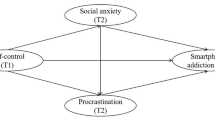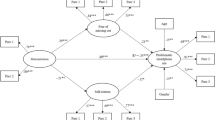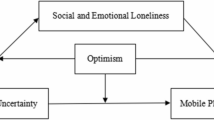Abstract
A questionnaire was administered to 1269 college students to examine if self-regulatory fatigue mediates the relationship between intolerance of uncertainty and smartphone addiction, and whether feeling of the passage of time moderates this relationship. The results showed that intolerance of uncertainty had a significant positive predictive effect on college students’ smartphone addiction, and that self-regulatory fatigue partially mediated the relationship between intolerance of uncertainty and smartphone addiction. Additionally, the relationship between intolerance of uncertainty and smartphone addiction was moderated by feeling of the passage of time. More specifically, the impact of intolerance of uncertainty on smartphone addiction is stronger when emotional affect and physiological susceptibility are heightened, and weaker when behavioral response tendency is increased. The study’s findings contribute to the literature on smartphone addiction mechanisms and have important practical implications for preventing and treating smartphone addiction.





Similar content being viewed by others
Data availability
The datasets generated during and/or analyzed during the current study are available from the corresponding author upon reasonable request.
References
Andrews, J. L., Li, M., Minihan, S., Songco, A., Fox, E., Ladouceur, C. D., ... & Schweizer, S. (2023). The effect of intolerance of uncertainty on anxiety and depression, and their symptom networks, during the COVID-19 pandemic. BMC Psychiatry, 23(1), 1–12. https://doi.org/10.1186/S12888-023-04734-8
Baumeister, R. F., & Vohs, K. D. (2016). Strength model of self-regulation as limited resource. Advances in Experimental Social Psychology, 54, 67–127. https://doi.org/10.1016/bs.aesp.2016.04.001
Bavolar, J., Kacmar, P., Hricova, M., Schrötter, J., Kovacova-Holevova, B., Köverova, M., & Raczova, B. (2023). Intolerance of uncertainty and reactions to the COVID-19 pandemic. The Journal of General Psychology, 150(2), 143–170. https://doi.org/10.1080/00221309.2021.1922346
Bazzy, J. D. (2018). Work ethic dimensions as predictors of ego depletion. Current Psychology, 37(1), 198–206. https://doi.org/10.1007/s12144-016-9503-6
Bell, S. B., & DeWall, C. N. (2019). Pressing the rewarding button: The relationship between impulsivity, fatigue, and reward sensitivity. Journal of Research in Personality, 79, 24–29. https://doi.org/10.1016/j.jrp.2019.01.004
Bijsterbosch, J. M., van den Brink, F., Vollmann, M., Boelen, P. A., & Sternheim, L. C. (2020). Understanding relations between intolerance of uncertainty, social anxiety, and body dissatisfaction in women. The Journal of Nervous and Mental Disease, 208(10), 833–835. https://doi.org/10.1097/NMD.0000000000001208
Billieux, J., Maurage, P., Lopez-Fernandez, D., & J. K. & Mark, D. G. (2015). Can disordered mobile phone use be considered a behavioral addiction? An update on current evidence and a comprehensive model for future research. Current Addiction Reports, 2, 156–162. https://doi.org/10.1007/s40429-015-0054-y
Buhr, K., & Dugas, M. J. (2002). The intolerance of uncertainty scale: Psychometric properties of the English version. Behaviour Research and Therapy, 40(8), 931–945. https://doi.org/10.1016/S0005-7967(01)00092-4
Cai, W. P., Chai, H. Y. Z., Tang, Y. X., Dong, W. & Yan, J. (2016). Perfectionism negative factor and test anxiety: Mediating effects of intolerance of uncertainty. Chinese Journal of Health Psychology, 24(03),458–461. https://doi.org/10.13342/j.cnki.cjhp.2016.03.038
Carleton, R. N., Desgagné, G., Krakauer, R., & Hong, R. Y. (2019). Increasing intolerance of uncertainty over time: The potential influence of increasing connectivity. Cognitive Behaviour Therapy, 48, 121–136. https://doi.org/10.1080/16506073.2018.1476580
Carnahan, N. D., Carter, M. M., & Sbrocco, T. (2022). Intolerance of uncertainty, looming cognitive style, and avoidant coping as predictors of anxiety and depression during COVID-19: A longitudinal study. International Journal of Cognitive Therapy, 15(1), 1–19. https://doi.org/10.1007/s41811-021-00123-9
Chen, J., Tan, Y., Cheng, X., Peng, Z., Qin, C., Zhou, X., ... & Lei, W. (2021). Maladaptive metacognitive beliefs mediated the effect of intolerance of uncertainty on depression. Clinical Psychology & Psychotherapy, 28(6), 1525–1534. https://doi.org/10.1002/cpp.2589
Cheng, S. H., Zhang, X. Y. & Han, Y. C. (2022). The relationship between fear of missing out and phubbing in college students: the chain mediating effect of intolerance of uncertainty and problem network use. Chinese Journal of Health Psychology, 30(09), 1296–1300. https://doi.org/10.13342/j.cnki.cjhp.2022.09.004
CNNIC. (2022). The 50th Statistical Report on the Development of the Internet in China. Retrieved December 25. https://www.cnnic.net.cn/n4/2022/0914/c88-10226.html
Correa, K. A., Li, L. Y., Nelson, B. D., & Shankman, S. A. (2022). Event-related potentials to acoustic startle probes during unpredictable threat are associated with individual differences in intolerance of uncertainty. International Journal of Psychophysiology, 174, 66–75. https://doi.org/10.1016/j.ijpsycho.2022.01.016
Coyne, S. M., Stockdale, L., & Summers, K. (2019). Problematic cell phone use, depression, anxiety, and self-regulation: Evidence from a three-year longitudinal study from adolescence to emerging adulthood. Computers in Human Behavior, 96, 78–84. https://doi.org/10.1016/j.chb.2019.02.014
Dong, J., Fu, S. Y., Lu, S., Yang, S. F., & Qi, C. H. (2018). Theoretical model and neural basis of self-control failure. Advances in Psychological Science, 26(01), 134–143. https://doi.org/10.3724/SP.J.1042.2018.00134
Dou, Z. F., Zhou, W., & Qiao, Z. H. (2017). Reward Model and Neural Mechanism of Self-control. Psychological Science Progress, 25(1), 86–98. https://doi.org/10.3724/SP.J.1042.2017.00086
Droit-Volet, S., & Dambrun, M. (2019). Awareness of the passage of time and self-consciousness: What do meditators report? PsyCh Journal, 8(1), 51–65. https://doi.org/10.1002/pchj.270
Droit-Volet, S., & Heros, J. (2016). Time judgments as a function of mindfulness meditation, anxiety, and mindfulness awareness. Mindfulness, 8(2), 266–275. https://doi.org/10.1007/s12671-016-0597-6
Duan, L., He, J., Li, M., Dai, J., Zhou, Y., Lai, F., & Zhu, G. (2021). Based on a decision tree model for exploring the risk factors of smartphone addiction among children and adolescents in China during the COVID-19 pandemic. Frontiers in Psychiatry, 12, 652356. https://doi.org/10.3389/fpsyt.2021.652356
Dugas, M. J., Gagnon, F., Ladouceur, R., & Freeston, M. H. (1998). Generalized anxiety disorder: A preliminary test of a conceptual model. Behaviour Research and Therapy, 36(2), 215–226. https://doi.org/10.1016/S0005-7967(97)00070-3
Esmaeilpour, F., Letafatkar, A., Baker, J. S., Dutheil, F., Khazaei, O., Rabiei, P., & Anarinejad, A. (2021). Reliability and construct validity of the smartphone addiction scale short version (SAS-SV) in Iranian students. Journal of Public Health, 31, 345–353. https://doi.org/10.1007/s10389-021-01529-7
Fortes, A. B., Broilo, P. L., & Lisboa, C. S. D. M. (2021). Smartphone use and psychological well-being: The moderating role of emotion regulation. Trends in Psychology, 29(2), 189–203. https://doi.org/10.1007/s43076-020-00051-1
Garrison, K. E., Finley, A. J., & Schmeichel, B. J. (2019). Ego depletion reduces attention control: Evidence from two high-powered preregistered experiments. Personality and Social Psychology Bulletin, 45(5), 728–739. https://doi.org/10.1177/0146167218796473
Geok, E. T., Lee, K. Y. C., & Sündermann, O. (2022). An experimental investigation of intolerance of uncertainty and its impact on sub-clinical psychopathology. Journal of Behavior Therapy and Experimental Psychiatry, 75, 101718. https://doi.org/10.1016/j.jbtep.2021.101718
Gillett, C. B., Bilek, E. L., Hanna, G. L., & Fitzgerald, K. D. (2018). Intolerance of uncertainty in youth with obsessive-compulsive disorder and generalized anxiety disorder: A transdiagnostic construct with implications for phenomenology and treatment. Clinical Psychology Review, 60, 100–108. https://doi.org/10.1016/j.cpr.2018.01.007
Golets, A., Farias, J., Pilati, R., & Costa, H. (2023). COVID-19 pandemic and tourism: The impact of health risk perception and intolerance of uncertainty on travel intentions. Current Psychology, 42, 2500–2513. https://doi.org/10.1007/s12144-021-02282-6
Han, S. W., & Kim, C. H. (2022). Neurocognitive mechanisms underlying internet/smartphone addiction: A preliminary fMRI study. Tomography, 8(4), 1781–1790. https://doi.org/10.3390/TOMOGRAPHY8040150
Hassan, T., Alam, M. M., Wahab, A., & Hawlader, M. D. (2020). Prevalence and associated factors of internet addiction among young adults in Bangladesh. Journal of the Egyptian Public Health Association, 95(1), 1–8. https://doi.org/10.1186/s42506-019-0032-7
He, A. M., & Xia, Y. Y. (2019). The effect of cell phone addiction on cognitive failure among college students: A moderated mediated model. Psychological Development and Education, 35(03), 295–302. https://doi.org/10.16187/j.cnki.issn1001-4918.2019.03.06
Hu, Q., Liu, Q., & Wang, Z. (2022). Meaning in life as a mediator between interpersonal alienation and smartphone addiction in the context of Covid-19: A three-wave longitudinal study. Computers in Human Behavior, 127, 107058. https://doi.org/10.1016/J.CHB.2021.107058
Hu, Y., Huang. H., Zhang, Y.Q., & Zhou, C. Y. (2017). The relationship between college students' mobile phone dependence and cognitive failure: the mediating role of negative emotions. Chinese Journal of Clinical Psychology, 25(06), 1088–1092. https://doi.org/10.16128/j.cnki.1005-3611.2017.06.020
Huntley, C., Young, B., Tudur Smith, C., Jha, V., & Fisher, P. (2022). Testing times: The association of intolerance of uncertainty and metacognitive beliefs to test anxiety in college students. BMC Psychology, 10(1), 1–7. https://doi.org/10.1186/s40359-021-00710-7
Islam, M. A., & Hossin, M. Z. (2016). Prevalence and risk factors of problematic internet use and the associated psychological distress among graduate students of Bangladesh. Asian Journal of Gambling Issues and Public Health, 6(1), 1–14. https://doi.org/10.1186/s40405-016-0020-1
Janssen, S. M., Naka, M., & Friedman, W. J. (2013). Why does life appear to speed up as people get older? Time & Society, 22(2), 274–290. https://doi.org/10.1177/0961463X13478052
Khang, H., Kim, J. K., & Kim, Y. (2013). Self-traits and motivations as antecedents of digital media flow and addiction: The Internet, mobile phones, and video games. Computers in Human Behavior, 29(6), 2416–2424. https://doi.org/10.1016/j.chb.2013.05.027
Koerner, N., Mejia, T., & Kusec, A. (2017). What’s in a name? Intolerance of uncertainty, other uncertainty-relevant constructs, and their differential relations to worry and generalized anxiety disorder. Cognitive Behaviour Therapy, 46(2), 141–161. https://doi.org/10.1080/16506073.2016.1211172
Korte, C., Friedberg, R. D., Wilgenbusch, T., Paternostro, J. K., Brown, K., Kakolu, A., ... & Leykin, Y. (2022). Intolerance of uncertainty and health-related anxiety in youth amid the COVID-19 pandemic: Understanding and weathering the continuing storm. Journal of Clinical Psychology in Medical Settings, 29(3), 645–653. https://doi.org/10.1007/s10880-021-09816-x.
Kosak, F., Schelhorn, I., & Wittmann, M. (2022). The subjective experience of time during the pandemic in Germany: The big slowdown. PLoS ONE, 17(5), e0267709. https://doi.org/10.1371/journal.pone.0267709
Lamotte, M., Chakroun, N., Droit-Volet, S., & Izaute, M. (2014). Metacognitive questionnaire on time: Feeling of the passage of time. Timing & Time Perception, 2(3), 339–359. https://doi.org/10.1163/22134468-00002031
Lapierre, M. A., Zhao, P., & Custer, B. E. (2019). Short Term longitudinal relationships between smartphone use dependency and psychological well-being among late adolescents. Journal of Adolescent Health, 65(5), 607–612. https://doi.org/10.1016/j.jadohealth.2019.06.001
Liu, Q. X., Yang, Y., Lin, Y., Yu, S., & Zhou, Z. K. (2017). Smart phone addiction: concept, measurement and influencing factors. Chinese Journal of Clinical Psychology, 25(1), 82–87. https://doi.org/10.16128/j.cnki.1005-3611.2017.01.019
Lopez-Fernandez, O. (2017). Short version of the Smartphone Addiction Scale adapted to Spanish and French: Towards a cross-cultural research in problematic mobile phone use. Addictive Behaviors, 64, 275–280. https://doi.org/10.1016/j.addbeh.2015.11.013
Martinelli, N., & Droit-Volet, S. (2022). What factors underlie our experience of the passage of time? Theoretical Consequences. Psychological Research, 86(2), 522–530. https://doi.org/10.1007/S00426-021-01486-6
McMillan, G., & Dixon, D. (2020). Self-regulatory processes, motivation to conserve resources and activity levels in people with chronic pain: A series of digital N-of-1 observational studies. Frontiers in Psychology, 11, 516485. https://doi.org/10.3389/fpsyg.2020.516485
Nes, L. S., Ehlers, S. L., Whipple, M. O., & Vincent, A. (2013). Self-regulatory fatigue in chronic multisymptom illnesses: Scale development, fatigue, and self-control. Journal of Pain Research, 6, 181–188. https://doi.org/10.2147/JPR.S40014
Noe, B., Turner, L. D., Linden, D. E., Allen, S. M., Winkens, B., & Whitaker, R. M. (2019). Identifying indicators of smartphone addiction through user–App interaction. Computers in Human Behavior, 99, 56–65. https://doi.org/10.1016/j.chb.2019.04.023
Oglesby, M. E., Allan, N. P., & Schmidt, N. B. (2017). Randomized control trial investigating the efficacy of a computer-based intolerance of uncertainty intervention. Behaviour Research and Therapy, 95, 50–57. https://doi.org/10.1016/j.brat.2017.05.007
Qing, Z. H., Liu, X. Q., Liu, L. J., Ma, Y. K., & Wu, C. H. (2022). The relationship between childhood psychological abuse and cell phone addiction among college students and the mediating and moderating role of social support. Chinese Journal of Clinical Psychology, 30(05), 1203–1207. https://doi.org/10.16128/j.cnki.1005-3611.2022.05.039
Roxburgh, S. (2004). “There just aren’t enough hours in the day’: The mental health consequences of time pressure. Journal of Health and Social Behavior, 45(2), 115–131. https://doi.org/10.1177/002214650404500201
Saulnier, K. G., Koscinski, B., Volarov, M., Accorso, C., Austin, M. J., Suhr, J. A., ... & Allan, N. (2022). Anxiety sensitivity and intolerance of uncertainty are unique and interactive risk factors for COVID-19 safety behaviors and worries. Cognitive Behaviour Therapy, 51(3), 217–228. https://doi.org/10.1080/16506073.2021.1976819.
Sjåstad, H., & Baumeister, R. F. (2018). The future and the will: Planning requires self-control, and ego depletion leads to planning aversion. Journal of Experimental Social Psychology, 76, 127–141. https://doi.org/10.1016/j.jesp.2018.01.005
Sundquist, J., Palmér, K., Memon, A. A., Wang, X., Johansson, L. M., & Sundquist, K. (2019). Long-term improvements after mindfulness-based group therapy of depression, anxiety and stress and adjustment disorders: A randomized controlled trial. Early Intervention in Psychiatry, 13(4), 943–952. https://doi.org/10.1111/eip.12715
Voitsidis, P., Nikopoulou, V. A., Holeva, V., Parlapani, E., Sereslis, K., Tsipropoulou, V., ... & Diakogiannis, I. (2021). The mediating role of fear of COVID-19 in the relationship between intolerance of uncertainty and depression. Psychology and Psychotherapy: Theory, Research and Practice, 94(3), 884–893. https://doi.org/10.1111/papt.12315
Volkmer, S. A., & Lermer, E. (2019). Unhappy and addicted to your phone? – Higher mobile phone use is associated with lower well-being. Computers in Human Behavior, 93, 210–218. https://doi.org/10.1016/j.chb.2018.12.015
Wang, L. G., Zhang, J. Y., Wang, J., Tao, T., Fan, C. L., & Gao, W. B. (2015). Validity and reliability of the Chinese version of the Self-regulatory Fatigue Scale to measure youth. Chinese Journal of Mental Health, 29(4), 290–294. https://doi.org/10.3969/j.issn.1000-6729.2015.04.010
Wang, Y., Zheng, Z., Duan, X., Li, M., & Li, Y. (2022). The relationship between mindfulness and social adaptation among migrant children in China: The sequential mediating effect of self-esteem and resilience. International Journal of Environmental Research and Public Health, 19(23), 16241. https://doi.org/10.3390/IJERPH192316241
Wang, C. Y., Lei, L., & Qiao, X. (2021). The mediating role of pleasure seeking between self-regulatory fatigue and smartphone addiction among college students: The moderating role of natural association. Psychological Development and Education, 37(4), 601–608. https://doi.org/10.16187/j.cnki.issn1001-4918.2021.04.17
Wen, F. F., Ding, Y., Yang, C., Ma, S. H., Zhu, J. L., & Xiao, H. R. (2022). Influence of smartphone use motives on smartphone addiction during the COVID-19 epidemic in China: The moderating effect of age. Current Psychology, 42(22), 19316–19325. https://doi.org/10.1007/S12144-022-03355-W
Wu, X. Y., Huang, X. & Li, J. (2021). The relationship between attachment anxiety and number hoarding behavior: the mediating role of intolerance of uncertainty and difficulties in emotion regulation. Chinese Journal of Clinical Psychology, 29(5), 996–999. https://doi.org/10.16128/j.cnki.1005-3611.2021.05.020
Xiong, J., Zhou, Z. K., Chen, W., You, Z. Q., & Zhai, Z. Y. (2012). The development of cell phone addiction tendency scale for college students. Chinese Journal of Mental Health, 26(3), 222–225. https://doi.org/10.3969/j.issn.1000-6729.2012.03.013
Yu, X. D., Deng, L. Y., Lu, C., & Gao, D. G. (2017). Sense of time passing: Conceptual exploration, questionnaire development and its reliability study. Psychological Technology and Applications, 5(9), 542–552. https://doi.org/10.16842/j.cnki.issn2095-5588.2017.09.005
Yu, X. D., Deng, L. Y., Xiong, X. L., Lu, C., & Gao, D. G. (2018a). Sense of Time Passing: A New Vision of Time Psychology. Psychological Research Psychologische Forschung, 11(06), 483–493.
Yu, X. D., Lu, C., & Gao, D. G. (2018b). A study on the relationship between sense of time passing and time perspective and personality. Psychological Techniques and Applications, 6(8), 493–502. https://doi.org/10.16842/j.cnki.issn2095-5588.2018.08.006
Yu, X. D, Xiong, X. L., Liang, X., Lu, C., Deng, L. Y., & Gao, D. G. (2021). College students ' identity status and time management: the mediating role of life time elapsed emotion and elapsed attention. Psychological development and education, 37(03), 381–390. https://doi.org/10.16187/j.cnki.issn1001-4918.2021.03.09
Zdebik, M. A., Moss, E., & Bureau, J. F. (2018). Childhood attachment and behavioral inhibition: Predicting intolerance of uncertainty in adulthood. Development and Psychopathology, 30(4), 1225–1238. https://doi.org/10.1017/S0954579417001614
Zhang, Q., Gong, J., Li, Y., Zhang, X. Y., & Shi, B. J. (2016). Investigation of factors influencing college students' propensity to smartphone addiction. China School Health, 37(1), 142–144. https://doi.org/10.16835/j.cnki.1000-9817.2016.01.045.
Zhang, Y. J., Song, J. B., Gao, Y. T., Wu, S. J., Song, L., & Miao, D. M. (2017). Reliability test of the intolerance of uncertainty scale (short version) among Chinese university students. Chinese Journal of Clinical Psychology, 25(2), 285–288. https://doi.org/10.16128/j.cnki.1005-3611.2017.02.020
Zhang, W., Zhou, F., Zhang, Q., & Lyu, Z. (2022a). Attachment anxiety and smartphone addiction among university students during confinement: Teacher–student relationships, student–student relationships and school connectedness as mediators. Frontiers in Public Health, 10, 1–14. https://doi.org/10.3389/FPUBH.2022.947392
Zhang, Y. H., Zheng, P. Y., Chen, D., Niu, Q. C., Pang, D., Song, A.Q.... & Di, Z. X. (2022b). The association between academic stress, social support, and self-regulatory fatigue among nursing students: a cross-sectional study based on a structural equation modeling approach. BMC Medical Education, 22(1), 1–10. https://doi.org/10.1186/S12909-022-03829-2
Funding
Science Research Project of Hebei Education Department (SQ2024178); Hebei Provincial Department of Human Resources and Social Security, HB20XW012, Yaming Zhang.
Author information
Authors and Affiliations
Corresponding author
Ethics declarations
Ethical approval
All procedures performed in studies involving human participants were in accordance with the ethical standards of the institutional and/or national research committee and with the 1964 Helsinki Declaration and its later amendments or comparable ethical standards.
Informed consent
Informed consent was obtained from all individual participants included in the study.
Conflict of interest
The authors declare that they have no conflict of interest.
Additional information
Publisher’s Note
Springer Nature remains neutral with regard to jurisdictional claims in published maps and institutional affiliations.
Rights and permissions
Springer Nature or its licensor (e.g. a society or other partner) holds exclusive rights to this article under a publishing agreement with the author(s) or other rightsholder(s); author self-archiving of the accepted manuscript version of this article is solely governed by the terms of such publishing agreement and applicable law.
About this article
Cite this article
Wang, S., Zhang, Y., Zhang, Y. et al. The effect of intolerance of uncertainty on smartphone addiction: a moderated mediation model of self-regulatory fatigue and feeling of the passage of time. Curr Psychol 43, 17118–17130 (2024). https://doi.org/10.1007/s12144-024-05655-9
Accepted:
Published:
Issue Date:
DOI: https://doi.org/10.1007/s12144-024-05655-9




